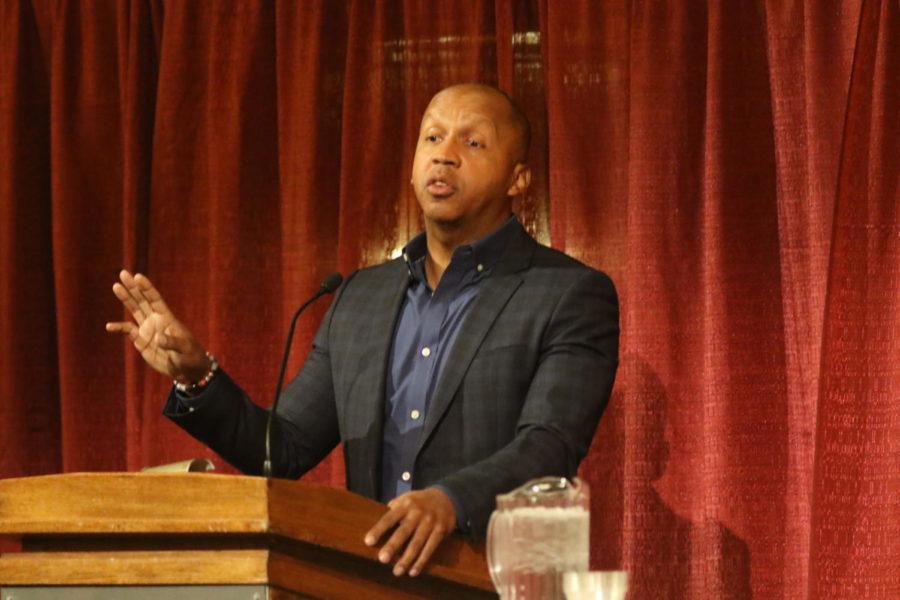Dr. Martin Luther King Jr. Keynote Speaker Addresses Racial Inequality
January 29, 2018
The United States is called the land of the free, the home of the brave.
The United States is also home to 25 percent of the world’s prison population, while boasting 5 percent of the world’s population in total.
Its contradicting narratives like this we must dismantle as a community in order to create a just society, according to public interest lawyer Bryan Stevenson. He spoke as the 2018 Dr. Martin Luther King Jr. Legacy Series Keynote speaker to more than 500 people in the Memorial Union Great Hall.
Stevenson is a law professor at the New York University School of Law and an author.
ISU students and faculty, Ames community members and even students from a nearby high school filled the hall Jan. 29 to listen to Stevenson’s advice about changing the world.
Stevenson is a Harvard Law School alumnus who founded the Equal Justice Initiative. His life’s work has been representing inmates on death row, and striving for equality and justice in a system which inhibits both those things.
He spoke of his home state of Alabama, where “nearly 30 percent of black men can’t vote because of criminal injustice.”
“One third of black male babies are predicted to go to prison in their adult lives,” Stevenson said, juxtaposing that statistic with the one in 17 white male babies who would share the same fate. “This profound absence of hope is shaping the children in our community.”
Stevenson has worked with children as young as nine who have been tried as adults in criminal court. He’s represented 13-year-olds who have faced life without parole or even the death penalty as punishments for their crimes.
“We are responsible for this, we created a society where not all children are children,” Stevenson said.
He recalled a 13-year-old child he represented on trial for the murder of his mom’s physically abusive boyfriend, who happened to be a sheriff’s deputy. The boy was immediately sent to a jail full of adult men where he was beaten, raped and abused for three days before he could see a lawyer.
“His lecture was really moving,” said Ruchi Patel, senior in architecture. “I personally am appalled at the death penalty, and am glad somebody like Stevenson is representing the mentally ill.”
Alyanna Subayno is also a senior studying architecture. She agreed with Patel.
“He really gave me hope for future change,” Subayno said.
“We’ve been silent about things we need to talk about,” Stevenson said. “Our parents, our grandparents, they should’ve done it. But they didn’t. So we have to.”
Stevenson said we must end these great injustices in four parts:
-
First we must get close to the broken and impoverished in our communities, or in other words “proximate ourselves to them.”
-
Then we need to “change the narratives beneath our current policies.” Stevenson used the war on drugs as an example of one of these narratives: He said, “Alcoholism we call a health problem, but with drug dependency we call them criminals.”
-
His third maxim is for people to hang on to hope. Stevenson said, “Hopelessness is the enemy of justice, and hope is what makes us stand when we’re told to sit down, speak when we’re told to stay quiet.”
-
The fourth and final step in Stevenson’s radical playbook is putting ourselves in uncomfortable situations. “Progress and change only happens when good people are willing to do uncomfortable things,” he said.
“The rule of narrative affects criminal justice, it affects every issue in the U.S.” said Ryoka Matsuno, senior in architecture. “He had good ideas about how we need to treat it and address it.”
Stevenson believes there are certain narratives our society postulates which make change impossible. They need to be overturned in order for us to move forward.
He used the history of indigenous communities of North America as an example.
“I believe what happened to the Native Americans was genocide,” Stevenson said. “We created a society that was comfortable with narratives of racial inequality to justify it, and that allowed slavery to prosper for two centuries.”
He ended his lecture by insisting everyone is capable of change as long as they abide by his maxims: Get close to the impoverished, defy the narratives the corrupt systems depend on, stay hopeful and be ready to get uncomfortable.
“I believe each of us is more than the worst thing we’ve done,” Stevenson said. “Your ability to change the world is not measured by your income. You must stay on the side of love in this fight for equality.”







